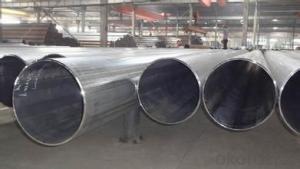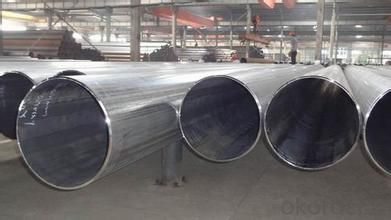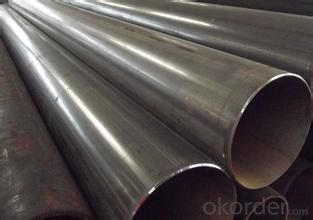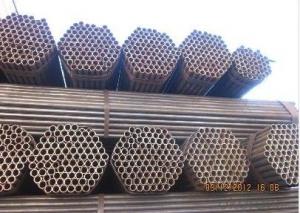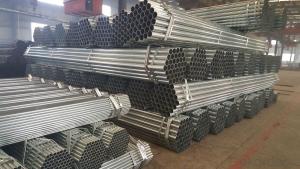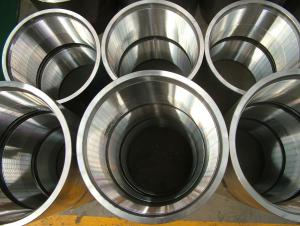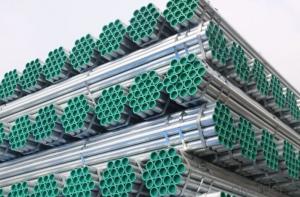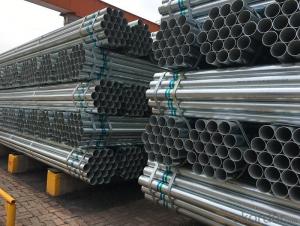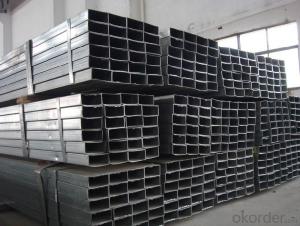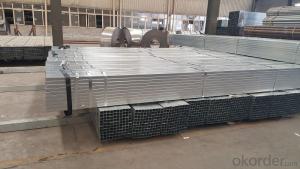Model and Diverse Range of Welded Pipe for Your Cooperation
- Loading Port:
- China main port
- Payment Terms:
- TT or LC
- Min Order Qty:
- 5 m.t.
- Supply Capability:
- 4000 m.t./month
OKorder Service Pledge
OKorder Financial Service
You Might Also Like
Product Description:
It is widely applied to line pipe and casing and tubing in oil transportation and casing field, and it is used in Low,high pressure liquid and gassy transportation and it is also good Structure pipe (for furniture, window, door, building , bridge, mechanical etc).
Standard of ERW Welded Pipes: API SPEC 5L, API SPEC 5CT, ASTM A53, GB/T9711.1
Steel Grade of ERW Welded Pipes:API SPEC 5L: B, X42, X46, X52, X56, X60, X65
API SPEC 5CT: J55, K55, N80, L80-1
ASTM A53: A, B, C
GB/T9711.1:L242、L290、L320、L360、L390、L415、L450
Sizes of ERW Welded Pipes:
Standard: GB/9711.1
Mechanical Properties
Remark: Besides below sizes, we also can arrange production based on requirement of customers
OD | WT | WEIGHT | ||||
INCH | MM | SCH | MM | INCH | KG/M | LB/INCH |
1 1/2” | 48.3 | STD-40 | 3.68 | 0.145 | 4.09 | 2.75 |
1 1/2” | 48.3 | XS-80 | 5.08 | 0.2 | 5.47 | 3.68 |
2” | 60.3 | STD-40 | 3.91 | 0.154 | 5.49 | 3.69 |
2” | 60.3 | XS-80 | 5.54 | 0.218 | 7.56 | 5.08 |
2 1/2” | 73 | STD-40 | 5.16 | 0.203 | 8.72 | 5.86 |
2 1/2” | 73 | XS-80 | 7.01 | 0.276 | 11.52 | 7.74 |
3” | 88.9 | STD-40 | 5.49 | 0.216 | 11.41 | 7.67 |
3” | 88.9 | XS-80 | 7.62 | 0.3 | 15.43 | 10.37 |
3 1/2” | 101.6 | STD-40 | 5.74 | 0.226 | 13.71 | 9.21 |
3 1/2” | 101.6 | XS-80 | 8.08 | 0.318 | 18.83 | 12.65 |
4” | 114.3 | STD-40 | 6.02 | 0.237 | 16.24 | 10.91 |
4” | 114.3 | XS-80 | 8.56 | 0.337 | 22.55 | 15.15 |
5” | 141.3 | STD-40 | 6.55 | 0.258 | 21.99 | 14.78 |
5” | 141.3 | XS-80 | 9.53 | 0.375 | 31.28 | 21.02 |
6” | 168.3 | STD-40 | 7.11 | 0.28 | 28.55 | 19.19 |
6” | 168.3 | XS-80 | 10.97 | 0.432 | 42.99 | 28.89 |
8” | 219.1 | STD-40 | 8.18 | 0.322 | 42.98 | 28.88 |
8” | 219.1 | XS-80 | 12.7 | 0.5 | 65.3 | 43.88 |
10” | 273 | STD-40 | 9.27 | 0.365 | 60.9 | 40.92 |
10” | 273 | 80 | 15.09 | 0.594 | 96.95 | 65.15 |
12” | 323.8 | STD | 9.53 | 0.375 | 74.61 | 50.13 |
12” | 323.8 | 40 | 10.31 | 0.406 | 80.51 | 54.1 |
12” | 323.8 | XS | 12.7 | 0.5 | 98.42 | 66.14 |
12” | 323.8 | 80 | 17.48 | 0.688 | 133.38 | 89.63 |
14” | 355.6 | 40 | 11.13 | 0.438 | 95.51 | 64.18 |
14” | 355.6 | XS | 12.7 | 0.5 | 108.48 | 72.9 |
14” | 355.6 | 80 | 19.05 | 0.75 | 159.71 | 107.32 |
16” | 406.4 | XS-40 | 12.7 | 0.5 | 124.55 | 83.69 |
18” | 457 | STD | 9.53 | 0.375 | 106.23 | 71.38 |
18” | 457 | 40 | 14.27 | 0.562 | 157.38 | 105.75 |
18” | 457 | 80 | 23.83 | 0.938 | 257.13 | 172.78 |
20” | 508 | 40 | 15.09 | 0.594 | 185.28 | 124.5 |
20” | 508 | 80 | 26.19 | 1.031 | 314.33 | 211.22 |
FAQ of Welded Pipe:
①How is the quality of your products?
Our products are manufactured strictly according to national and internaional standard, and we take a test on every pipe before delivered out. If you want see our quality certifications and all kinds of testing report, please just ask us for it.
Guaranteed: If products’ quality don’t accord to discription as we give or the promise before you place order, we promise 100% refund.
②How about price?
Yes, we are factory and be able to give you lowest price below market one, and we have a policy that “ for saving time and absolutely honest business attitude, we quote as lowest as possible for any customer, and discount can be given according to quantity”,if you like bargain and factory price is not low enough as you think, just don’t waste your time.Please trust the quotation we would give you, it is professional one.
③Why should you chose us?
Chose happens because of quality, then price, We can give you both.Additionally, we can also offer professional products inquiry, products knowledge train(for agents), smooth goods delivery, exellent customer solution proposals.Our service formula: good quality+good price+good service=customer’s trust
SGS test is available, customer inspection before shipping is welcome, third party inspection is no problem.
Any question, pls feel free to contact us !
Welded Pipe Images:
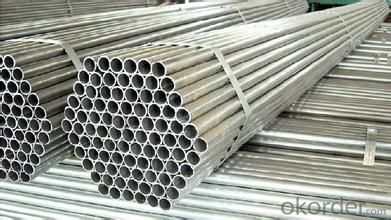
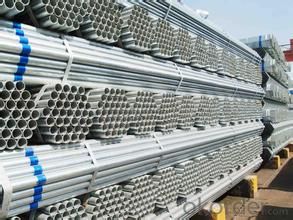
- Q: What are the common protective coatings used on the inner surface of steel pipes?
- The common protective coatings used on the inner surface of steel pipes include epoxy, polyurethane, and cement mortar coatings. These coatings provide corrosion resistance, prevent the formation of scales, and improve the durability and lifespan of the pipes.
- Q: How are steel pipes used in the construction of chemical plants?
- Steel pipes are widely used in the construction of chemical plants due to their durability, corrosion resistance, and ability to handle high pressure and temperature. These pipes are primarily utilized for transporting various chemicals, gases, and liquids within the plant, ensuring a safe and efficient flow of materials throughout the facility. They are commonly employed in the installation of process pipelines, utility systems, and structural supports, playing a crucial role in the overall functionality and reliability of chemical plants.
- Q: How are steel pipes used in the oil and gas industry?
- Steel pipes are extensively used in the oil and gas industry due to their durability and strength. They are used for various purposes like drilling, transportation, and processing of oil and gas. Steel pipes are employed in drilling wells, providing a conduit for the extraction of oil and gas from the ground. Additionally, they are used for gathering and transporting hydrocarbons from the wellhead to processing facilities or storage tanks. Steel pipes also play a crucial role in the construction of refineries and petrochemical plants, where they are used for the transportation of various fluids and gases involved in the refining process.
- Q: Can steel pipes be used for structural supports in buildings?
- Steel pipes have the capability to serve as structural supports in buildings. Their reputation for strength, durability, and ability to bear heavy loads is well-known. Their high tensile strength allows them to endure immense tension and compression without fracturing or distorting, making them an excellent choice for buildings that necessitate robust and stable supports. Steel pipes have numerous applications in construction, including as columns, beams, trusses, or even as the primary support for an entire structure. Moreover, they possess great versatility and can be easily fabricated and tailored to meet specific design requirements. Furthermore, steel pipes offer resistance to fire, corrosion, and pests, rendering them a dependable option for enduring structural support in buildings over the long term.
- Q: What are the thermal properties of steel pipes?
- Steel pipes have excellent thermal conductivity, allowing them to efficiently transfer heat. They also have a high melting point, making them suitable for high-temperature applications. Moreover, steel pipes have a low coefficient of thermal expansion, meaning they can withstand significant temperature changes without warping or deforming.
- Q: How are steel pipes protected against external damage?
- Steel pipes are protected against external damage through various methods such as coating them with protective materials like polyethylene or epoxy, using cathodic protection techniques, and implementing physical barriers like concrete encasement or pipe sleeves. These measures help prevent corrosion, impact, and abrasion, ensuring the durability and longevity of the steel pipes.
- Q: What are the different types of steel pipe valves?
- Various industries and applications commonly utilize several types of steel pipe valves. Here, we present some of the most frequently used types: 1. Gate valves: These valves control fluid flow by raising or lowering a gate or wedge that obstructs the flow path. They ensure a tight seal when closed and are prevalent in applications requiring complete shut-off or full flow. 2. Globe valves: With a globe-shaped body and a movable plug or disc, these valves regulate fluid flow. They excel in throttling capabilities and find application in situations demanding precise flow control. 3. Ball valves: Fluid flow is managed by a rotating ball with a hole in these valves. Alignment of the hole with the pipe signifies full openness, while a perpendicular hole indicates closure. Ball valves are durable, reliable, and extensively used in swift and effortless shut-off applications. 4. Check valves: These valves allow fluid flow in only one direction, preventing backflow. They are instrumental in safeguarding pumps, compressors, and other equipment from reverse flow-induced damage. 5. Butterfly valves: Butterfly valves feature a rotating disc within the pipe to control fluid flow. They are lightweight, compact, and provide rapid shut-off. Butterfly valves are commonly employed in large-scale applications like water treatment and HVAC systems. 6. Plug valves: By utilizing a cylindrical or conical plug, plug valves regulate flow within the valve body. Their simple design, ease of operation, and dependable shut-off capabilities make them prevalent in applications requiring frequent operation and high pressure ratings. 7. Diaphragm valves: These valves employ a flexible diaphragm to manage fluid flow. Pressing the diaphragm against the valve seat blocks flow, while lifting it allows flow. Diaphragm valves are frequently used in environments requiring sterility or hygiene. These examples illustrate the variety of steel pipe valves available in the market. The choice of valve depends on specific requirements, including flow rate, pressure, temperature, and the nature of the transported fluid.
- Q: Can steel pipes be used for transporting chemicals?
- Yes, steel pipes can be used for transporting chemicals. Steel pipes are known for their strength and durability, making them suitable for various applications, including the transportation of chemicals. Additionally, steel pipes are resistant to corrosion, which is crucial when dealing with potentially corrosive substances. However, it is important to ensure that the specific type of steel used in the pipes is compatible with the chemicals being transported to prevent any reactions or contamination.
- Q: What are the different methods of protecting steel pipes from corrosion?
- There are several methods of protecting steel pipes from corrosion, including coating the pipes with materials such as epoxy, polyethylene, or zinc; applying cathodic protection by using sacrificial anodes or impressed current; and employing corrosion inhibitors to prevent the formation of rust. Regular maintenance and inspections are also crucial in identifying and addressing any potential corrosion issues.
- Q: What is the maximum temperature that steel pipes can handle?
- The maximum temperature that steel pipes can handle varies depending on the specific grade and type of steel used. However, in general, steel pipes can withstand high temperatures ranging from 750 to 1200 degrees Celsius (1382 to 2192 degrees Fahrenheit).
Send your message to us
Model and Diverse Range of Welded Pipe for Your Cooperation
- Loading Port:
- China main port
- Payment Terms:
- TT or LC
- Min Order Qty:
- 5 m.t.
- Supply Capability:
- 4000 m.t./month
OKorder Service Pledge
OKorder Financial Service
Similar products
Hot products
Hot Searches
Related keywords
